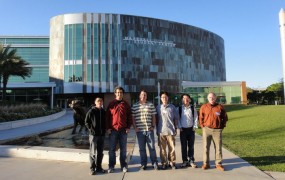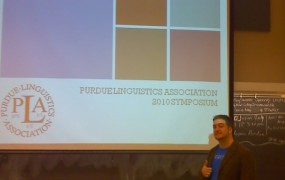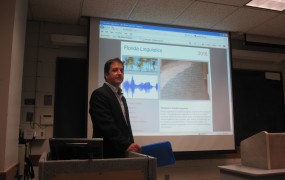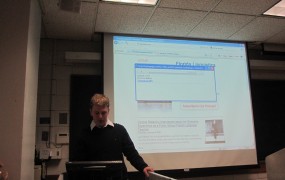The Mainstreaming of the Linguistic Sciences
Wednesday, February 16th, 2011 @ 9:27PM
–Article by Tyler McPeek
For awhile now, I’ve been working on a site that deals with issues related to Japan, Japanology, and the Japanese language. What originally started as a kind of “Japan Fan” site, assisting and entertaining people who study Japanese, enjoy “things Japanese,” have lived in Japan, or hope to live in Japan, took on new meaning for me when I started studying linguistics. I realized that I was doing a disservice to my visitors, especially those who are studying the Japanese language, if I don’t provide a scientific view of the Japanese language that is geared to the mainstream and literary student of Japanese. In fact, the mainstreaming of the linguistics discipline for literature and foreign language discipline-based students of language generally has become a very important issue and goal for me.
When talking to a friend from Taiwan, I was somewhat surprised to hear that Taiwan has not a single undergraduate linguistics department, although they do have graduate programs. What was even more surprising was the fact that all students of English, and presumably other foreign languages, in Taiwan are required to take at least an intro course in linguistics. So, while the Taiwanese do not have any universities who have reached the level of offering an undergraduate program in linguistics, they appear to understand the importance of linguistics and the scientific study of language to the average language learner better than Americans, though we have many undergraduate programs in the US. We are missing something important here in The Sates. Our view of “language” seems incomplete somehow.
My TenColors.com site now contains a “Japanese Linguistics” section, which, to my amazement, appears to be the first of its kind to appear in a non-linguistics-geared language and culture site. I have been trying to impress upon my site visitors and Japanese language-studying friends the importance of gaining a scientific appreciation for the language you are studying. Japanese language sites are littered with blog posts and questions, where advanced Japanese L2 language learners (and sadly, even native and second language instructors of Japanese) are puzzling over questions that are fairly easily answered by students of Japanese Linguistics. The only way to Japanese Linguistics is through Linguistics departments, not through Japanese Language or Literature departments. Fellow linguists, this can’t be the way.. and this situation is not unique to Japanese, unfortunately.
There have been some strides though. We can see that the scientific and theory driven field of SLA has started to show practical linkages to and appear in required course lists for students of ESL/EFL/TESL. We can expect, or hope at least, to see more and more linkages between the science of language and the application of language. This is not simply the old “theory vs. applied” rivalry, it’s deeper. What we are talking about is the mainstreaming of linguistic basics outside of linguistics departments. The rift is not between applied and theoretical experts within linguistics departments, it is between the literati and the linguists. This is the rift that we need to bridge. At least the basics of linguistics should be a set of courses that cross departments and are equally important to all, not simply a set of teaser courses for linguistics departments to recruit more linguistics majors form the liberal arts colleges. I teach one of these course, and in my view, the strategy is misguided. Likewise, “Structure of Japanese,” “Structure of English” and the like should be required courses not only for foreign language students and student teachers, but even for English Literature majors who are native English speakers. These students have the need for a scientific perspective on their own languages, perhaps more than anyone. Certainly it must seem strange to linguists to hear that someone who has a PhD in “English” from a major US, UK, or Commonwealth university doesn’t know what the aspiration rule of English is—though it’s one of the most basic phonological rules of the English language, and highly systematic and predictable. Sadly, this is the norm. I feel a sense of this mission, perhaps not least because I come from a literary, creative writing, business, and EFL background and am now studying linguistics. I plan to devote a lot of my future efforts to building bridges from linguistics to the world of business communication, literature, technical writing, and foreign language learning and teaching. www.tencolors.com is one of those efforts, and the marketing of linguistics to the generalist that you see taking place on Florida Linguistics is another avenue. I hope others will join me.
And let’s not fool ourselves, fellow students, about the rift between so-called “prescriptivists” and “descriptivists” in this infant discipline of ours. It is no less erroneous than that between “applied” (the so called applied linguistic sciences, which have their own theory and need theory to apply in any case) and “theoretical.” It is yet just another manifestation of our (thus far) failure to market our field to academics of other departments. The grammarians and prescriptivists of secondary schooling that we have been told are the enemies and villains of language science are just other teachers of language that have not been given the motivation or training to apply a scientific perspective to either English or “foreign” language instruction. The threshold is high for acceptance of such a radical injection into traditional language teaching to be sure, but isn’t it our responsibility to market our theory as accessible, significant, and relevant at a basic and non-threatening or intimidating level? And if this is so, then so called “prescriptivists” are really just pre-Chomskyan language professionals and experts who haven’t received the “good news” of modern language science. People, linguists, let us set the record straight. It is the so-called “descriptivists,” not the “prescriptivists” that are to blame for this oversight.
Posted by floridalinguistics
Categories: Tyler McPeek









